The familiar "prairie crocus" or "pasque flower" is the harbinger of spring across the prairies, blooming more-or-less around that most unpredictable of holidays, Easter - depending on the timing of the snow melt, and in those increasingly rare places where the grasslands have not been too severely disturbed. They occur here up through the montane-to-lower alpine zone, blooming even into early July.
From along the Bow River in Calgary (#1-5), and lastly, in seed, from an alpine ridge in Kananaskis Prov. Park:

Comments
Richard T. Rodich
Re: Pulsatilla patens
Sat, 02/20/2010 - 4:47pmThe Minnesota native ones I've seen are quite blah, color wise. A dirty white with a very slight pinky purple overtone. How I envy everyone else's! The only thing that blooms earlier here (sometimes) is our Trillium nivale. Oh wait, skunk cabbage is there somewhere too.
Lori S. (not verified)
Re: Pulsatilla patens
Sun, 02/21/2010 - 8:41amIt would be interesting to see some pix, for comparison. It seems to me, from memory, that P. patens on the prairies east of here are more vividly and variably coloured, too.
I'd love to see your skunk cabbage too. I've only seen it on rare spring driving trips west of the divide, e.g. Mount Revelstoke N.P. Skunk Cabbage Trail:
http://www.flickr.com/photos/mary-roy/3701748988/
Richard T. Rodich
Re: Pulsatilla patens
Sun, 02/21/2010 - 7:44pmFunny, I don't think I have ever taken a photo of skunk cabbage. I'll have to rectify that. There is a good spot for them about 25 miles away, a bit downstream from Minnehaha Falls. I remember in my youth when I came upon some in the early summer in the high hills above Duluth, MN. The leaves were so GIANT! I had never seen them, other than at bloom time, and I didn't figure out what they were until years after.
Pulsatilla patens grows in a few places around 50 miles from me. I have always caught them at the end of their bloom, and they just didn't seem photo-worthy. One place they grow in abundance is particular part of the Mississippi River bottoms in pure sand. The tract has sand that shifts around, and there are several active blowout areas. The acreage is called the Sand Dunes SNA (Scientific and Natural Area), but I think "dunes" is stretching the meaning a bit. It is a state protected area.
Barbara L. Weintraub
Re: Pulsatilla patens
Thu, 03/18/2010 - 3:19pmI think I have one surviving P. patens. I've been planting natives that should or could be found on my property and pulling enormous amounts of weeds. I will finally start constructing a real rock garden this year that will include western natives and whatever else strikes my fancy. I would be happy to have P. patens scattered in the natural land as well as the cultivated gardens. Unfortunately, it needs more moisture and shelter than it would see on my property naturally, so will always need auxiliary water.
Perhaps I'll get out early enough to locate P. patens this year. Where do you think it might be found at this latitude? 8000 feet? 9000 feet? Under Ponderosa pines? In the Sangre de Cristos or the Jemez Mountains? I'd love to collect seed and just scatter it about.
Panayoti Kelaidis
Re: Pulsatilla patens
Thu, 03/18/2010 - 6:22pmHeavens, Barbara! Pasqueflowers are ubiquitous. The trick is just to get out early. Most years we have some blooming in March around Denver (mine are all budding up already at home) and definitely by April. Hereabouts you can find them by the thousand and million: all the ponderosa pine woods are full of them (along with Claytonia lanceolata and Kinnikinnick) and open meadows right down to the Great Plains: there are huge stands on the piedmont mesas around Boulder that can have fifty flowers on them in sparse grass alongside cacti and yuccas!
I have seen them still blooming in mid July still on the Medicine Bow, for instance, where there is a huge stand on Snowy Pass just as you approach treeloine growing in a long, long swale with Erythronium grandiflorum and Anemone narcissiflora.
And they grow everywhere in between if you poke around early enough! Go get 'em!
Trond Hoy
Re: Pulsatilla patens
Fri, 03/19/2010 - 3:58amHere's my skunk cabbage! They self-sow in my little bog.
I have no Pulsatilla patens but the Norwegian equivalent P. vernalis. However no good picture! The color of vernalis is all white. I'll try to catch them this year!
PS! I got two of the same picture! How do I remove one?
Trond Hoy
Re: Pulsatilla patens
Fri, 03/19/2010 - 4:01amHere's the other.
Lori S. (not verified)
Re: Pulsatilla patens
Fri, 03/19/2010 - 9:13amWonderful to see those skunk cabbage, Trond!
Re. removing the duplicate photo, you could do it yourself, by going in and clicking "Modify", open "Additional Options", and then just remove the check mark from the second photo... or I think I could just fix it for you and save you the trouble!
Trond Hoy
Re: Pulsatilla patens
Fri, 03/19/2010 - 9:55amThanks! I tried to, but I didn't see the "additional options"!
Richard T. Rodich
Re: Pulsatilla patens
Tue, 03/30/2010 - 12:05amI was a bad boy today. Instead of cleaning up the gardens, writing for our upcoming chapter newsletter or even sowing seeds, I had to get away. I took a trip to the Weaver Dunes I previously talked about. This has been the third warmest March for us on record, and also one of the driest. While you'd think things would be way ahead of schedule, the lack of precipitation has slowed spring growth considerably.
I was pleased to find that the Nature Conservancy with the MN Department of Natural Resources had flash burned part of area. I could not find any pasque flowers anywhere else (though I know they are there), but the sun's rays warmed the black surface charred by they fire, and there they were. What a treat! And the lack of vegetation made it so easy to photograph! I have never found them at this early stage before. I am always too late, and I don't think I would have much success finding them in the mid grasses where they grow when they are this small anyway.
Though I had not planned to turn myself black, laying on the charred surface to snap pictures, I was happy to "oblige." Likewise, letting sand permeate my clothing was also a willing act. However, the char never adhered, and the sand was so clean that at the end of the day, so was I! I literally washed my hands with sand. And, somehow, the sand refused to remain in my clothing, too. That is certainly some special sand. And I never thought I say anything like that before...
The dunes are deposited from glacial river(s) after the last ice age. The sand is up to 150 feet deep. At least for Minnnesota, it is a very special place.
Richard T. Rodich
Re: Pulsatilla patens
Tue, 03/30/2010 - 12:13amI just couldn't stop taking photos...
Trond Hoy
Re: Pulsatilla patens
Tue, 03/30/2010 - 2:36amLucky you! My local "pasque flowers" (mogop, P. vernalis) here in the Norwegian mountains are still covered with 2-3' of snow. They will not flower until early May when the spring gets hold here.
Mark McDonough
Re: Pulsatilla patens
Tue, 03/30/2010 - 5:06amGreat photos Rick, those fuzzy profiles are fantastic. You know, too often I take for granted a plant species, and I didn't realize where this plant was native to, the USDA Map was a bit of a shocker for me; didn't realize Pulsatilla patens had such a broad range, from Alaska to Texas. Interesting that it has the common name "eastern pasqueflower" when it seems mostly a western species, although extends eastward as far as Michigan and Ontario.
USDA Map:
http://plants.usda.gov/java/profile?symbol=PUPA5
Richard T. Rodich
Re: Pulsatilla patens
Tue, 03/30/2010 - 9:46amAgreed. There are usually lots of niches well into the east where a prairie plant might grow, even though there are no prairies. In the northern Minnesota coniferous forests of the BWCA along the Canadian border, I find lots of indigenous "prairie" plants.
Todd Boland
Re: Pulsatilla patens
Wed, 03/31/2010 - 4:50pmRick, you are having a much earlier spring than last year...the most we saw was snowdrops! My Pulsatilla are all under snow still. I seem to be so far behind everyone.
Richard T. Rodich
Re: Pulsatilla patens
Wed, 03/31/2010 - 7:40pmThat's right, Todd. I recall how you have always started your springs before me, but then I always catch up, since my spring is much abbreviated.
Trond Hoy
Re: Pulsatilla patens
Wed, 03/31/2010 - 11:14pmDon't be sad, Todd! Where I am now it is still 2-3 feet of snow and we had 5" more yesterday. All my plants here are covered and they will not surface before late April! On our way here we drove through Oslo and my mums garden is still covered by one foot of snow. Although the spring starts early at home where I live it is not like that in all Norway!
Lori S. (not verified)
Re: Pulsatilla patens
Fri, 04/23/2010 - 9:40pmHere are more Pulsatilla patens, from my bike ride home through the uplands along the Bow River the other day. I was rather surprised to see so many still in bloom, as when I'd gone out to look at them on April 4th, it looked as though they were almost done blooming in this area.
Todd Boland
Re: Pulsatilla patens
Sun, 04/25/2010 - 3:16pmAh Lori, I miss that scene...most years when I've been in Calgary, I arrive in late April just in time to see this display.
Panayoti Kelaidis
Re: Pulsatilla patens
Sun, 02/13/2011 - 7:28pmIt's a bit early to expect Pulsatilla patens to be out many places in its range: we have found this wonderful plant to be challenging in our gardens thus far: I believe it is very sensitive to overwatering. Strange that we can grow hundreds of cacti, calochorti, no end of agaves and other xerophytes, and it's our native pulsatilla I invariably kill first...I think it will have to grow in a shady, unwatered garden for us.
But it has an almost identical cousin that I have enjoyed for years: it came to me as Pulsatilla "taurica var. halleri" and may or may not be true halleri. But it looks remarkably like our native Pulsatilla but grows with ease in our rock garden and goes from strength to strength...
I especially enjoy the new buds emerging in the spring...
Aaaah! Spring! Will it ever come? (My friends in San Francisco taunt me with all their talk of Magnolias and mumes and what not.....grrrrr)
maggiepie (not verified)
Re: Pulsatilla patens
Mon, 02/14/2011 - 4:50amHow beautiful!!
My pulsatillas ( if alive) are under 4 ft of snow :'(
Trond Hoy
Re: Pulsatilla patens
Mon, 02/14/2011 - 12:34pmHelen, isn't that better than not covered by snow at this time of the year?
Here the weather forecast says biting cold weather and strong wind the next week - and I have no snow cover :'( :'(
maggiepie (not verified)
Re: Pulsatilla patens
Mon, 02/14/2011 - 6:08pmTrond, am mostly concerned because we had an extremely wet autumn and early winter with quite a few freeze/thaws before we finally got snow cover.
I wish I could send you some snow!
Paul T (not verified)
Re: Pulsatilla patens
Wed, 02/16/2011 - 4:55pmGorgeous Pulsatilla pics everyone.
Panayoti,
That P. halleri pic is a stunner. They're so perfect!!!
The Pulsatilla do OK in my garden, or at least used to. I lost a lot due to our drought the last few years and the low levels of soil moisture even with watering. With our decent rain this year it might be time to invest in a few again to try to establish them once more. The flowers are so beautiful.
Todd Boland
Re: Pulsatilla patens
Sat, 02/19/2011 - 10:53amHelen, sounds like you have the same amount of snow as I do...oh well, we'll have Pulsatilla months after some of the others...they will be distant memories for them but fresh ones for us!
cohan (not verified)
Re: Pulsatilla patens
Wed, 03/09/2011 - 5:38pmI don`t think I`ve seen a Pulsatilla I didn`t like ;D
So far I have a couple of vulgaris (in my only `spring`bed so far--poorly sited I realised in a spot that stays cold long, so I`ll probably be able to show flowers even after Todd and Helen melt out ;D ) plus some seedlings and seeds...
Lori S. (not verified)
Re: Pulsatilla patens - the 2011 bloom!
Sat, 04/30/2011 - 8:40amThe harbinger of spring on the Canadian prairies - Pulsatilla patens - is in glorious bloom! Here are a few shots from my bike ride home Thursday along the Bow River through NW Calgary.
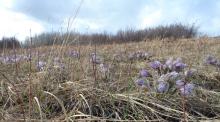
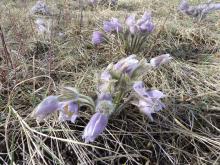
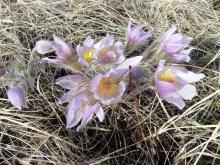
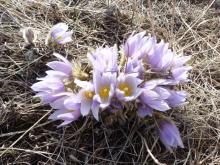
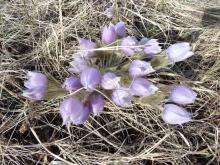
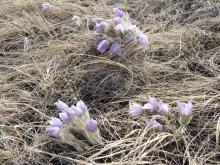
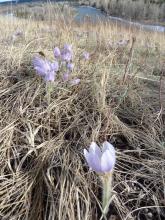
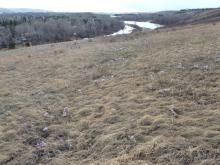
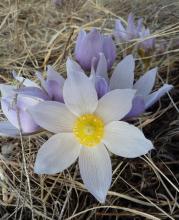
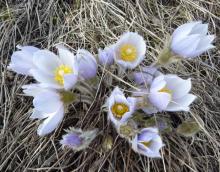
Lori S. (not verified)
Re: Pulsatilla patens - the 2011 bloom!
Sat, 04/30/2011 - 8:46amIt's wonderful to have this bit of unbroken prairie, in the middle of the city, surrounded by residential streets!
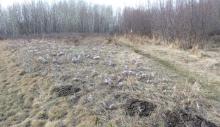
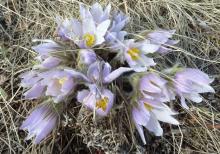
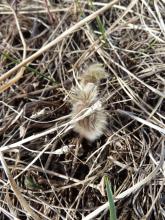
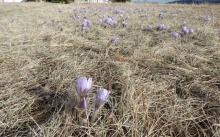

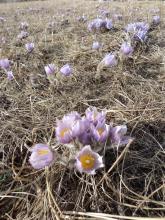
McGregorUS (not verified)
Re: Pulsatilla patens
Sat, 04/30/2011 - 10:05amWhat stunning pictures - absolutely fabulous. Thank you Lori.
Trond Hoy
Re: Pulsatilla patens
Sat, 04/30/2011 - 2:12pmI can't copy such scenes but I have decided to try to establish P patens at my cabin along with P vernalis. I had several seedlings growing, however almost all died of lack of water during the Easter holiday :'( (I didn't loose any other plants though.)
Mark McDonough
Re: Pulsatilla patens
Sat, 04/30/2011 - 7:37pmIncredible to see such masses of P. patens!
Lori S. (not verified)
Re: Pulsatilla patens
Sat, 04/30/2011 - 11:21pmYou're welcome, Malcolm!
How disappointing, Trond!
Where there is still unbroken prairie (not that there is much), this sort of density of plants is not unusual!
cohan (not verified)
Re: Pulsatilla patens - the 2011 bloom!
Sun, 05/01/2011 - 4:16pmGreat to see these :) I was hoping to try to get east to find some in flower this spring, not sure if I'll get the right timing....
Todd Boland
Re: Pulsatilla patens
Sun, 05/01/2011 - 4:18pmLooks like spring has finally hit the Calgary region! My vulgaris are just starting to show wee buds, so I am quite far behind.
Lori S. (not verified)
Re: Pulsatilla patens
Sun, 05/01/2011 - 4:28pmYes, in between the snow storms... :P
cohan (not verified)
Re: Pulsatilla patens
Sun, 05/01/2011 - 4:36pmAs of today, we still have snowbanks in many places, and --mosquitoes!
Trond Hoy
Re: Pulsatilla patens
Mon, 05/02/2011 - 1:04pmSnow, what is that ;D ;D ;D
Don't be angry, I am just teasing. Next winter we shall have a tough one I have read. The sun is diminishing :o The sunspot activity is rather low although it is slowly increasing now after a two year delay.
cohan (not verified)
Re: Pulsatilla patens
Mon, 05/02/2011 - 7:51pmEvery winter is a tough one...lol
I just need to try to scrounge some money together for at least part of our firewood, and something to help with moving snow---then I might be able to sit inside by the fire and 'enjoy' the season instead of working to exhaustion for 5 months...lol
Trond Hoy
Re: Pulsatilla patens
Wed, 05/04/2011 - 4:45amMaybe your health is better off with hard work than with noising machines and badsmelling exhaust! Snow outside, fire at the fireplace, a glass of red wine or something on the rocks - that can't be healthy ;D
cohan (not verified)
Re: Pulsatilla patens
Wed, 05/04/2011 - 11:50amNo danger, Trond-- I will have lots of hard work to do, no matter what! But I think an occasional day of rest is healthy too? ;) When the snow shovelling is 6 months, and woodcutting is ..10?....
I've still been doing some snow shovelling (even yesterday) to help snow banks in shady places go away (to let the driveway dry up!) and still large expanses of snow in some other shady areas I don't care about....
No wine here, just coffee...lol
Trond Hoy
Re: Pulsatilla patens
Wed, 05/04/2011 - 12:12pmI have done some "hard work" myself the last weeks, no snow shuffling then, but masonry and stonebuilding. I have built a new step of big natural flat stones. Had to remove the old one (also stone) and rearrange the steps.
cohan (not verified)
Re: Pulsatilla patens
Wed, 05/04/2011 - 3:39pmStone work is heavy for sure! Will you be planting in the cracks of the stone?
Trond Hoy
Re: Pulsatilla patens
Wed, 05/04/2011 - 11:36pmI did plant in the previous step but dandelions, grasses, campanulas, yellow corydalis etc invaded it! Can't use anything valuable to compete with those ;D
Richard T. Rodich
Re: Pulsatilla patens
Sun, 04/08/2012 - 9:27pmWell apparently, Minnesota does have well colored Pulsatilla patens. This is grown from wild seed (not by me) from Becker County in the northwest of the state. And in a serendipitous conversation, I spoke with someone who has actually seen them there, and she verifies that they are indeed purple. According to Minnesota flora literature, the stage of leaf growth in relation to the flower blooming is also with in the species' parameters.
Trond Hoy
Re: Pulsatilla patens
Mon, 04/09/2012 - 12:34amI can't decide which is the better fom - the coloured or the white - so I gladly go for both ;)